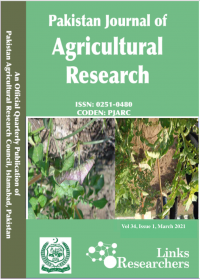Physiological and Bio-Chemical Responses of Two Different Wheat Genotypes to Applied Salicylic Acid under Salt Stress
Physiological and Bio-Chemical Responses of Two Different Wheat Genotypes to Applied Salicylic Acid under Salt Stress
Muhammad Suhaib1*, Ijaz Ahmad2, Masooma Munir3, Badar-Uz-Zaman1, Bushra Atta4 and Muhammad Khubaib Abuzar5
ABSTRACT
A hydroponic study was conducted to figure out the response of two different wheat genotypes supplemented with salicylic acid (0.25 and 0.5 mM) under salt stress (75 and 150 mM). It’s an obvious factor that under salt stress certain reactive oxygen species are produced that damage the vital plant organelles causing disturbances in the normal functioning of the plant and even may lead to death in severe cases. The results of this study conferred that there were genotypic variation found in two genotypes regarding salinity tolerance. SARC-4 was found to tolerate more salt stress as compared to Parwaz-94 and performed better at both salinity levels then Parwaz-94. Salicylic acid induced improvement is significant regardless of stress environment or normal growth conditions. While regarding salicylic acid induced amelioration it was notable that both levels of salicylic acid had significant effects on the physiology and biochemical parameters of crop plants however lower level of salicylic acid 0.25 mM was found more efficient then the higher level of salicylic acid. Salicylic acid induced improvement is significant regardless of stress environment or normal growth conditions.
To share on other social networks, click on any share button. What are these?






